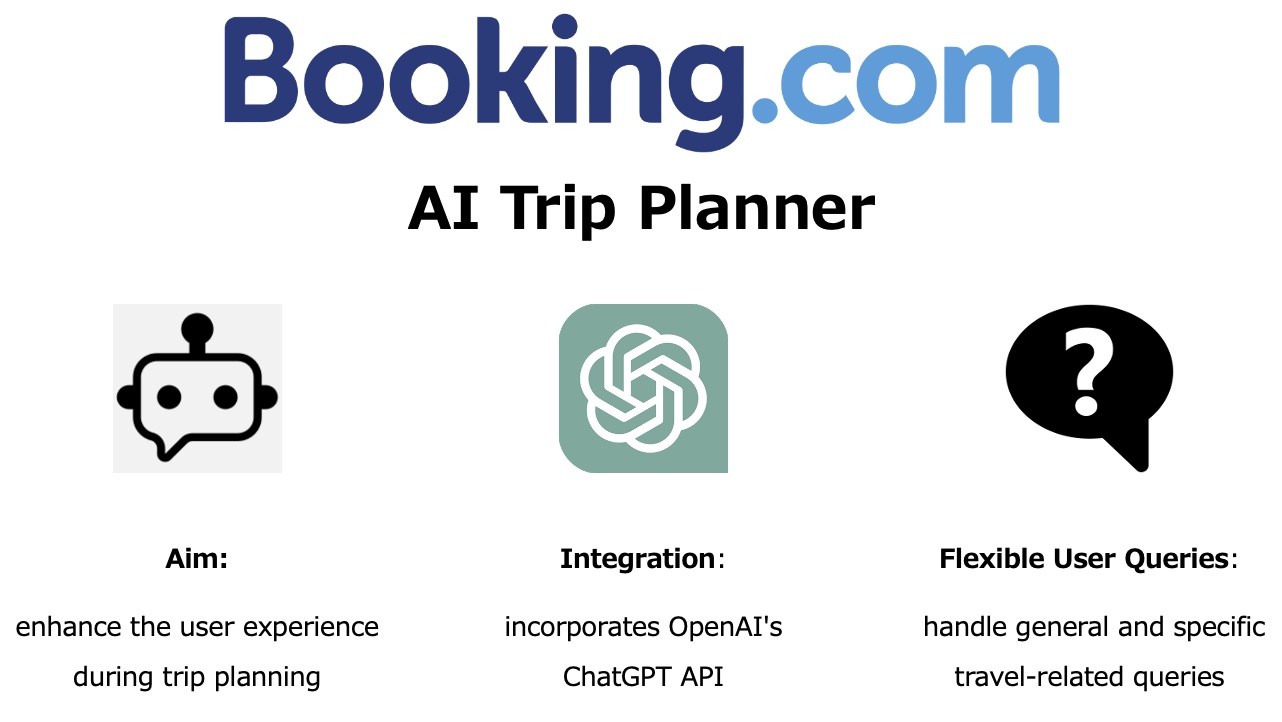
Booking.com, a significant player in the global travel industry, has launched a conversational AI tool in beta form to select US travelers. The new tool, dubbed “AI Trip Planner” has been developed to offer an enhanced trip planning experience.
It extends the functionality of Booking.com’s existing machine-learning models, which are already used for destination and accommodation suggestions. Integrating OpenAI’s ChatGPT API, known for its language comprehension capabilities, AI Trip Planner is expected to facilitate smoother and more interactive user experiences.
Booking.com says it has been designed to respond to broad and specific travel-related queries throughout the trip planning process, from researching potential destinations to generating complete itineraries. The tool is part of the Booking.com app, so users can easily go back and forth between chatting with the AI and using the app to think about and make reservations.
The aim is to decrease the time people spend on trip planning; it provides tailored travel recommendations based on users’ queries, regardless of how broad or specific they may be. It also opens the door for data-driven insights that could enhance the user experience. By learning from users’ booking habits and preferences, the AI can offer personalized suggestions, further refining the search process and potentially uncovering options users might not have considered.
The AI Trip Planner beta version will be initially available to Booking.com Genius members in the United States. Access requires users to be signed into their Booking.com app accounts, with the language settings in English. A phased rollout is planned over the coming weeks.
The introduction of this tool reflects Booking.com’s ongoing efforts to leverage emerging technologies in order to improve the customer experience. By continuing to develop innovative and user-focused tools like the AI Trip Planner, Booking.com is striving to maintain its place within the competitive travel industry.
“Like how you would begin to talk about planning a trip with your partner of friends”
“Our primary aim at Booking.com has always been to leverage technology to make travel easier,” said Glenn Fogel, CEO of Booking.com. “The recent developments with generative AI are accelerating the work we’ve been doing for years with machine learning to enhance and improve every aspect of the customer experience on our platform, whether it’s optimizing the right order to display a hotel’s photos to surfacing the most relevant reviews. Our new AI Trip Planner is simply the next step in our ongoing journey to explore how we can bring even more value, and hopefully enjoyment, to the entire trip planning process.”
“Our new AI Trip Planner provides us with some really exciting possibilities to help our customers plan and search for travel options in a very natural, human way,” commented Rob Francis, Booking.com CTO. “Oftentimes, people are asked to adapt to the confines of technology to do what they want, but with generative AI, we’re able to start having scalable, one-to-one conversations with our customers on their terms, much like how you would begin to talk about planning a trip with your partner or friends. It’s just the beginning, but we have lots of runway here to explore in order to innovate and connect the travel experience further on Booking.com, all in a safe, ethical and inclusive way.”
AI: reshaping the travel industry
As anyone who’s spent hours planning a trip can attest, the process can be complex and, at times, frustrating. The rise of online booking platforms simplified things a lot years ago, but there’s not been much disruption until the recent advent of AI, which is now on course to turn the world of travel planning on its head – simplifying the process even more so.
By integrating OpenAI’s ChatGPT API into the tool, Booking.com is bringing the conversational ability of AI to the forefront, marrying human-like interaction with digital efficiency (as it’s designed to answer both general and specific questions). This level of customization offers users a highly tailored experience, moving away from the one-size-fits-all approach often seen in traditional travel planning platforms.
However, the advent of AI in travel booking also prompts important questions about data privacy and security. As AI tools learn from our behavior and preferences, it’s crucial that companies prioritize robust data protection measures and maintain transparency about how user data is used.
All in all, Booking.com’s AI Trip Planner heralds a new era in travel planning, one that leverages AI’s power to transform the booking process into a personalized, efficient, and interactive experience. It underscores the immense potential AI holds in improving customer service across sectors, marking a significant step forward in the convergence of technology and user experience.
